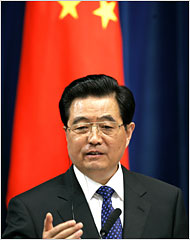Chinese President Hu Jintao to Attend Nuclear Security Summit
April 1, 2010
Featured Image
We are happy to serve you a daily summary of the day's top nuclear policy stories each morning, with excerpts from the stories in bullet form.
Stories we're following today:
Despite Strains, China Leader to Attend Nuclear Meeting in U.S. - New York Times [link]
- President Hu Jintao of China will attend a nuclear security summit in Washington later this month, an indication that strained relations between the United States and China may be easing.
- Until the announcement on Thursday by the Chinese Foreign Ministry, American officials feared that Mr. Hu would boycott the talks to express China’s displeasure over a series of recent diplomatic clashes, including a White House decision to sell arms to Taiwan and President Obama’s meeting with the Dalai Lama, the exiled Tibetan leader.
- The security meeting, scheduled for April 12 and 13, seeks to limit the proliferation of nuclear materials “so that they never fall into the hands of terrorists,” President Obama said in announcing it in his State of the Union speech in January.
- The confirmation that President Hu will take part in the summit came less than day after the Chinese government appeared to throw its support behind new United Nations sanctions aimed at pressuring Iran over its nuclear program.
U.S. Officials: No Daylight Between Medvedev and Putin on Nuke Treaty - Foreign Policy's The Cable [link]
- During the most contentious moments of the U.S.-Russian negotiations over a new nuclear treaty, it often seemed as if Russian President Dmitry Medvedev and Prime Minister Vladimir Putin were working at cross purposes.
- Not so, according to two senior administration officials, who said that the negotiations changed the way the Obama White House viewed the roles of Medvedev and Putin.
- Overall, it was the personal involvement of Medvedev and Obama that pushed the negotiations past difficult roadblocks at several stages, they said.
- For example, during one round of talks on Feb. 24, Obama took a hard stand against Russian attempts to have language regarding U.S. missile defense in the treaty, which would be a nonstarter for many Senate Republicans whose support will be needed for ratification.
- "In a very tough phone call, he just said to President Medvedev, ‘If you want this, we have to walk away from this treaty, we can't do it this way,'" one official remembered. "It was a pretty dramatic moment, but in retrospect, we now know that because Obama was so firm in that phone call, we got some motion in Geneva [where the text of the treaty was being negotiated] from that moment on."
Major Powers Agree to Pursue New Iran Sanctions - Associated Press [link]
- Six major world powers agreed Wednesday to begin putting together proposed new sanctions on Iran over its suspect nuclear program after China dropped its opposition.
- "China has agreed to sit down and begin serious negotiations here in New York ... as a first step toward getting the entire U.N. Security Council on board with a tough sanctions regime against Iran," Susan Rice, the American ambassador to the U.N., told CNN.
- China's change of position improves prospects for passing a resolution aimed at pressuring Iran to scale back its nuclear ambitions, which Tehran insists are limited to developing nuclear power for peaceful purposes.
START Follow-on: The Senate Calculus - John Isaacs in the Bulletin of the Atomic Scientists [link]
- At long last, the United States and Russia are on the verge of signing a new treaty that reduces the countries' nuclear arsenals. The result of these difficult negotiations will now face what could be equally tortuous consideration by the U.S. Senate.
- It is a Senate bitterly divided between Democrats and Republicans, where comity is disappearing and bipartisan lawmaking largely has been replaced by the majority Democrats trying to build a legislative record for the 2010 and 2012 elections and the minority Republicans determined to prevent any major legislation from passing. Making matters worse, the recent yearlong battle to pass health-care reform has left tempers rawer than ever.
- There is some possibility of a vote before the midterm elections, but there may be more of a possibility in the lame-duck, post-election session in the fall. A potential clincher for a 2010 vote: The longer the treaty is in limbo, the longer the means of verifying Russia's enormous nuclear arsenal remain suspended. Even Jon Kyl might not like that.
A View from the Dark Side
Crashing Obama's Nuclear Wedding - Kim Holmes in the Washington Times [link]
- Raising concerns about a new nuclear arms treaty is considered declasse. It's about as welcome as a wedding crasher who questions the groom's choice of a bride.
- The real issue is not whether this agreement is a step toward removing some terrible legacy, but whether it will make Americans and the world more secure.
- With this treaty the Russians are trying to constrain our advantage in conventional (non-nuclear) "strategic" weapons, including missile defense, in order to accentuate the power of their nuclear arsenal.
- Ultimately, if ratified, this treaty will indeed mean the death of any zero-nuke option. It feeds Russia's expectations that it can effectively challenge the U.S. and still maintain a peer relationship with us through its reliance on nuclear weapons.



